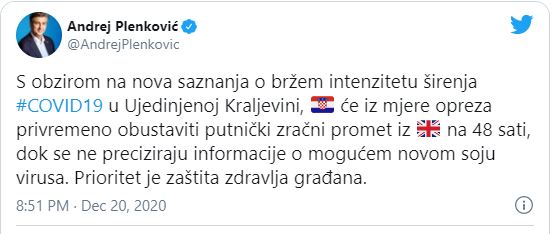Capak: First Batch of Pfizer Vaccine to Consist of 9,750 Doses
ZAGREB, Dec 21, 2020 - The first batch of Pfizer's COVID-19 vaccine will be delivered to Croatia on December 26, and the 9,750 doses will be distributed among the counties taking into account the size of their population, Croatian Public Health Institute (HZJZ) director Krunoslav Capak said on Monday.
"A total of 9,750 doses of the Pfizer vaccine will be sent to Croatia on December 26. We will try to vaccinate as many people as possible with this symbolic dose," Capak told a press conference of the national COVID-19 response team.
This symbolic first batch will not be enough to vaccinate the whole first priority group of people in Croatia. "The vaccine will primarily be administered to care home residents, some of the emergency medical workers and some of the health workers in COVID centres," Capak said.
Capak noted that Pfizer had pledged to deliver additional supplies on December 31 which would be used to vaccinate the whole first priority group. He said that discussions were under way on the vaccination of the second priority group, including people suffering from chronic diseases and those older than 65 years.
Capak pointed out that 27% fewer new coronavirus infections had been recorded in the week from December 15 to 21 than in the previous week.
Croatia has the third highest 14-day COVID-19 incidence rate and the ninth highest mortality rate in the European Union.
Bozinovic: Special Instructions for Orthodox Christmas if Required
ZAGREB, Dec 21, 2020 - The head of the national COVID response team, Interior Minister Davor Bozinovic on Monday said that the government had agreed with Orthodox Church dignitaries that if required, special epidemiological instructions for Orthodox Christmas would be defined in the first week of January.
"As far as Orthodox Christmas is concerned... government representatives contacted Orthodox Church dignitaries and it was agreed that if required, special instructions will be defined in the first week of January, depending on epidemiological developments and the specificities of Orthodox liturgy," Bozinovic said.
He said that by 10 am 1,120 calls, 5,600 e-mails and a total of 10,848 applications had been received related to passes for travel within the country.
Asked whether criminal charges had been filed against the founder of the Index.hr web portal Matija Babic, who called for churches to be burnt down, Bozinovic said that the police were familiar with that post and that they were taking action within their remit.
He recalled that Minister of Transport and Infrastructure Oleg Butkovic had, in agreement with Prime Minister Andrej Plenovic, made a decision on a 48-hour ban on passenger flights from Great Britain due to the emergence of a new strain of coronavirus in that country.
Croatia's Coronavirus Update: 766 New Cases, 80 Deaths, 3,208 Recoveries
ZAGREB, Dec 21, 2020 - In the last 24 hours, of 4,614 performed for coronavirus, 766 have returned positive (16.6%), and there have been 80 COVID-related deaths, bringing the death toll to 3,257, Croatia's COVID-19 crisis management team reported on Monday morning.
There are currently 16,105 active cases, including 2,956 patients who are receiving hospital treatment. Of them 294 are placed on ventilators.
Since February 25, when Croatia registered its first case of the infection, a total of 195,728 people have contracted the novel coronavirus, and of them, 176,366 have recovered including 3,208 who have recovered from the disease in the last 24 hours.
There are currently 50,799 people in self-isolation.
Since the outbreak of the epidemic, Croatia has conducted 955,255 coronavirus tests.
E-Passes in Croatia are Here: Everything You Need to Know About Getting One
December 21, 2020 - From December 21, e-passes in Croatia are available again, enabling citizens to easily send requests using the e-Citizens (e-Građani) system and NIAS services (National Identification and Authentication System).
The e-passes system provides the following functionalities for citizens:
- submission of applications to issue e-passes to the competent civil protection headquarters
- an overview of submitted e-pass requests and their status
- view and download approved e-passes in PDF format
Recall, following the Decision on the ban of leaving the county according to the place of residence or stay in the Republic of Croatia, it is prohibited to leave the place of residence or stay from December 23, 2020, to January 8, 2021.
The main reason for this decision is to restrict movements and travel that are not necessary for the functioning of the economy and society as a whole and prevent the transmission of COVID-19. Requests for passes are sent to the county headquarters according to the place of residence or stay of the person submitting the request, or to the Directorate of Civil Protection if it is for another justified reason. Also, given the intention of the decision, it is noted that the Directorate of Civil Protection will restrictively interpret 'other justifiable reasons' and citizens are asked not to apply for passes if they really do not have a serious and justifiable reason to leave the county where they reside or stay.
Some categories of persons necessary for the functioning of the economy and the community, as well as categories of persons involved in preventing the spread of COVID-19, are exempted from this prohibition.
Categories of persons who are exempt from the ban that allows them to do so can prove:
- an identity card or other identification document
- e-pass
Persons who do not have an identity card or other identification document may request a pass from the county civil protection headquarters according to their place of residence or stay.
Since not all life situations can be predicted in advance, there is a possibility to obtain a pass in cases of other justified reasons, which are issued by the Directorate of Civil Protection. Other justified reasons are, for example: going to sports competitions and training that have not been suspended, going to hotels or other accommodation facilities for which payments have been made no later than the day the decision enters into force (23.12.2020), enabling the execution of court decisions related to the right of parents to spend weekends or holidays with their children, going to the funeral of a close family member, return or an immediate trip abroad, etc.
Passes do not have a deadline for which they are issued.
The following categories of persons are exempted from the ban on leaving the county due to the activities or jobs they perform:
a) staff necessary for traffic maintenance and supply
- the staff of transport and supply companies, where persons must have one of the following documents - CMR, consignment note, delivery note or other document from which the name and surname of the driver, the goods and the registration number of the vehicle transporting those goods are clearly visible
- also includes personnel necessary for the activity of distribution of mail and parcels, and they prove their status by an identity card or a certificate issued to them by the employer on the form here
b) daily migrations of employees in services important for the provision of health and veterinary protection, delivery of medicines and sanitary material, maintenance of communal activities, water supply, and drainage, gas and electricity supply, security services
- persons listed in this category prove their status during daily migrations, i.e., travel to and from work with an identity card, other identification documents, or a document which can prove affiliation to one of the listed categories of persons (e.g., ID cards of health care institutions, chambers, etc.)
- if the persons do not have any of the above-mentioned documents for daily migrations, i.e., travel to and from work, the employer may issue them a certificate.
c.) reporting to the public
- persons listed in this category prove their status with a press card.
d.) patients requiring medical care
- it is necessary that persons in need of medical care have a pass, and a pass, if necessary, can be issued to a person accompanying or transporting a person in need of medical care - a request for a pass is submitted to the county headquarters of civil protection according to the residence or stay of the person in need of medical care.
e.) travel to and from work if the job is necessary and cannot be done from home
- it is necessary that this category of persons has a pass when traveling to and from work because they do not have the necessary ID card or other identification documents - the request for a pass is submitted to the county civil protection headquarters according to the residence of the person requesting the pass.
f.) emergency and operational services involved in preventing the spread of COVID-19
- persons listed in this category when traveling to and from work prove their affiliation to these services with an identity card or other identification document
g.) diplomatic staff
- the persons listed in this category prove their status with a diplomatic card.
Therefore, persons listed in the categories marked under a), b), c), f) and g) should not ask for passes but can move from the county in which they reside or stay to the county in which they perform their activity or work based on ID cards, other identification documents, or a certificate from the employer.
Persons listed in the categories marked under d) and e) should request an e-pass from the county headquarters according to the place of residence or stay.
Persons who have another justified reason, which is not stated in the decision, may request a pass from the Directorate of Civil Protection.
How to apply for e-passes?
Requests for e-passes are sent to the county headquarters according to the place of residence or stay of the person submitting the request, or to the Directorate of Civil Protection if it is another justified reason that is not listed, through the e-Pass system (available at https://epropusnice.gov.hr/). Exceptionally, if the applicant cannot access the e-pass system, the request can be sent by e-mail to the competent headquarters' e-mail address. In this case, the request should contain the following information: name and surname, OiB, residential address (street and house number, place/city, county), travel route (place/city of departure and place/city of destination), and justification of the request.
The list of contacts and e-mail addresses to which requests are sent can be found below:
Popis Kontakata Za Izdavanj... by Index.hr
E-Pass Process:
Go to: https://epropusnice.gov.hr
- Select a list of credentials, as with any other access to the system
- Confirm your details
- Select one of the options: request a pass, preview a pass, or request a review
- If you want to submit a request for a pass, fill in the required information and confirm the request
- Once approved, your e-pass will be visible in pdf format
According to the Civil Protection HQ, detailed instructions for using the e-pass system and customer support contacts can be found on the home page of the system.
How is an employer's certificate issued?
As the instructions list the categories of persons who are exempted from the ban on leaving the county in which they reside or stay due to their activities or jobs, only in these cases would it be left to employers who perform activities or jobs necessary for the functioning of the community to issue certificates to their employees who are necessary for them to perform their activities. The certificate will be valid only if it is issued on the prescribed form.
Citizens are asked not to submit requests if they do not have serious reasons.
"Since the basic intention of this decision is to restrict all movements and journeys that are not necessary for the functioning of the economy and the community, attention is drawn to all officials and employees who are not prohibited from leaving the county where they reside or stay to perform their official activity or work and can use ID cards or other identification documents only for official use, i.e., business needs, for movement between the county where they reside or stay and the county where they perform the activity or work.
Likewise, employers who have been allowed to issue certificates should issue them only to the staff they need to perform the activity or job and only for official purposes (for example, certificates cannot be issued to workers who are on holiday, sick leave, or work from houses, etc.).
Also, considering the intention of the Decision, it is noted that the Civil Protection Directorate will interpret other justifiable reasons, and citizens are asked not to apply for passes if they really do not have a serious and justifiable reason to leave the county in which they reside or stay," said the Civil Protection HQ.
Contact for additional passes inquiries:
This email address is being protected from spambots. You need JavaScript enabled to view it.
tel. 0800 80 90
https://epropusnice.gov.hr/
Source: Index.hr
To read more about coronavirus in Croatia, follow TCN's dedicated page.
Croatia Imposes Temporary Ban on Flights from UK over New Coronavirus Variant
December 21, 2020 - Croatia, along with several other countries, has introduced a temporary ban on flights from UK due to the new coronavirus variant there.
December 22 update - this ban has now been extended until December 31.
A late-night tweet from Croatian Prime Minister Andrej Plenkovic yesterday evening:
"Croatia is temporarily suspending passenger flights from Great Britain in the period of next 48 hours as a precaution, until we are provided with more precise information about the new variant of the virus," Prime Minister Andrej Plenkovic wrote on the Twitter on Sunday evening.
"Protecting the health of citizens is a priority," Plenkovic tweeted.
Apart from Croatia, France, Ireland, Germany, Austria, Bulgaria, the Netherlands, Canada and Italy as well as some more European nations have already begun to apply travel bans with the UK after it reported a more infectious and "out of control" coronavirus variant.
The whole European Union is set to impose the ban, and the consultations are under way on the joint response to travel by sea, rail and road from Great Britain.
The ban, already in place, is the first ban imposed on any country due to coronavirus by Croatia, which has enacted a much more relaxed approach to interpretations of EU directives. It was the only EU country open to Americans this summer, initially without a negative PCR test until July 10.
Croatia will most likely follow other EU countries with the current ban. Whatever happens with the ban, there will be a change in British requirements to enter Croatia from January 1, when the Brexit transition period ends. Currently, Croatia is closed to non-EU/EEA countries for tourism until at least January 10, although some tourists have been able to enter for economic reasons with accommodation fully paid in advance.
For the latest situation on the ground, the real time experiences of the Total Croatia Travel INFO Viber community have been invaluable.
Join the Total Croatia Travel INFO Viber community.
For the latest travel info, bookmark our main travel info article, which is updated daily.
Read the Croatian Travel Update in your language - now available in 24 languages.
Visit Portugal, a Lesson in Promotion of Remote Worker Tourism
December 20, 2020 - Tourism promotion in the corona era has been a challenge. One tourist board has been doing things rather well - lessons from Portugal.
Is it worth even promoting tourism during a pandemic, with future travel so uncertain?
This year has brought unprecedented challenges to the tourism industry, from event management to marketing and promotion. While many destinations chose to remain quiet or engage in campaigns such as #CroatiaLongDistanceLove, the best Croatian destination for 2020 promotion in my opinion was Zagreb, and the Croatian capital responded brilliantly to the twin disasters of the pandemic and earthquake with some very innovative marketing on a budget. Campaigns such as Zagreb Loves You and From Zagreb Balconies and the new Around Zagreb platform are but some examples.
One tourism country stood out for me in 2020 for its tourism promotion. So much so in fact, that we have decided to visit when we next get round to that foreign holiday - Portugal.
Portugal first came on my tourism radar this year back in April, being the first, along with South Africa, to post a promotional video aimed at the post-corona world, with a global captive audience locked down and yearning to travel.
Both Portugal and South Africa's videos stood out at the time as beacons of hope and positivity. I remember discussing Portugal as a place to visit with the family a couple of times over lunch.
I was back to Portugal in August while researching new avenues for Croatian tourism to move it a more sustainable and 12-month destination. Portugal is doing everything right - Lessons from Portugal: Taking Advantage of the Retirement Lifestyle Opportunity.
And, as we approach the end of the year, Visit Portugal is featuring large in my social media feed. Either Facebook has been listening to our family luncheon conversations, or perhaps our coverage of digital nomads is the reason, but I have been peppered with Visit Portugal ads in the last 24 hours, a different one every time I go on Facebook.
So why visit Portugal if you are a remote worker? The food perhaps. Head to the Algarve and 10 Michelin Star restaurants.
Perhaps you are a hiker. More than 190 miles of trails to explore when you close down the laptop.
Looking for a little socially-distanced sport after work. There is none so socially distanced as golf, and the Algarve is one of the premier golf regions of Europe.
A culture vulture? More than 75 museums and art galleries from your temporary home in Porto.
Or what better way to kick start the day in the Lisbon region than a little surfing from one of 25 surfing spots.
What I particularly liked was that each ad led to the same landing page, which summarised the tourism offer of Visit Portugal in 12 sections, each with their own short intro paragraph and dedicated promo video: the cities Lisbon and Porto; sun, sea and beach; walking and cycling trips; paths of faith; surfing; golf; wines; gastronomy; UNESCO World Heritage Sites; read Portugal; travelling in safety; and the people. In 30 minutes, accompanied by some great short videos, the entire offer for remote workers is presented.
When do flights from Zagreb to Lisbon start up again?
Retired Bishop Mile Bogovic Dies from COVID-19
ZAGREB, Dec 20, 2020 - Bishop Mile Bogovic of Gospic-Senj died at the age of 81 on Saturday from the consequences of COVID-19, 16 days after the onset of symptoms, the Gospic-Senj Diocese said.
Msgr Bogovic was born in 1939 in Cerovac near Slunj in Karlovac County. He was ordained a priest of the Rijeka-Senj Archdiocese on 29 June 1964 and retired in 2016.
By dividing the territory of the Rijeka-Senj Archdiocese on 25 May 2000, Pope John Paul II established a new diocese with its seat in Gospic, appointing Msgr Mile Bogovic the first bishop of the new Gospic-Senj Diocese.
Croatia Registers 1,975 New Coronavirus Infections, 76 Deaths
ZAGREB, Dec 20, 2020 - Over the past 24 hours, Croatia has registered 1,975 new cases of the coronavirus infection and 76 deaths, the national COVID-19 crisis management team said on Sunday.
The number of active cases in Croatia today stands at 18,627, including 2,976 COVID patients in hospitals, 290 of whom are on ventilators.
Since February 25, when Croatia registered its first case of the infection, a total of 194,962 people have contracted the novel coronavirus, 3,177 of them have died, and 173,158 have recovered, including 3,390 in the last 24 hours.
There are currently 55,417 people in self-isolation.
To date, 950,611 people have been tested, 9,191 of whom over the past 24 hours.
Nenad Bakic: Why Has the Virus Become So Deadly in the New EU Countries?
December 20, 2020 – The European Union has so far recorded over 300,000 deaths caused by the coronavirus pandemic, with the second wave being 50 percent more deadly than the first one. It is easily possible that the total number will exceed half a million by the time the pandemic is brought under control. Mathematician, investor, and analyst Nenad Bakic explains why for Index.hr.
In terms of the number of deaths per million inhabitants, the new members of the European Union, the countries of the "new European Union", namely the former socialist countries – including, unfortunately, Croatia – are in the lead. Some of them have several tens of times more deaths in the second wave than in the first.
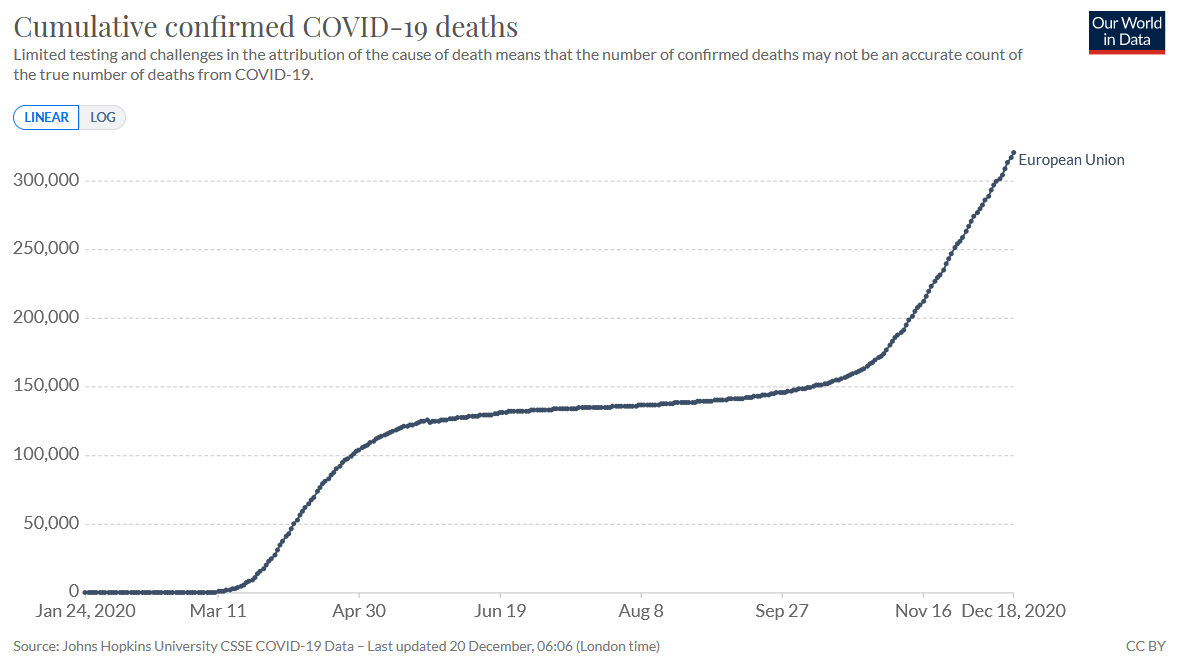
Confirmed cases of death due to coronavirus in the European Union / Source: ourworldindata.org
What is happening? Why did the virus in the second wave become so deadly in the new European Union members? By studying this example, we can learn a lot about the pandemic in general.
- The countries of the New European Union (NE), 11 ex-socialist countries, did very well in the first wave, with only one of them among the 13 most-affected. All the governments of these countries attributed the success to themselves. In some countries like Croatia, it was done by gurus who considered themselves ideologues of barbaric imprisonment or, as they ignorantly called it, "quarantine".
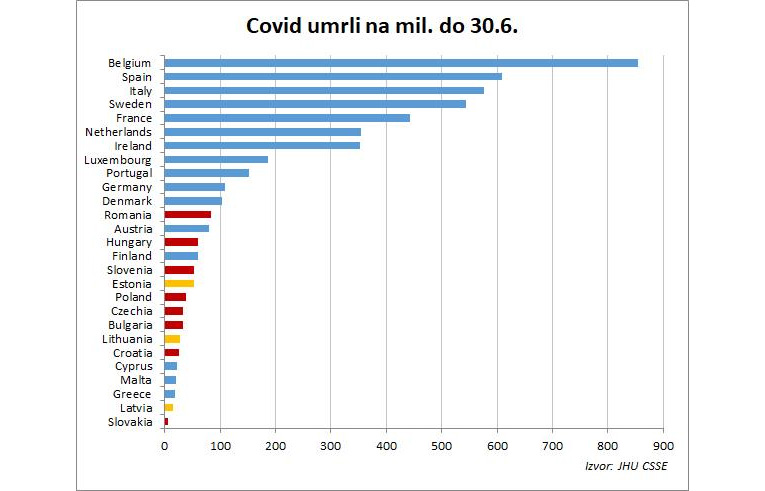
Graph 1. Coronavirus deaths per million, until June 30, 2020. Source: Index.hr / JHU CSSE
They are marked in red on the first graph. A lighter shade highlights the small Baltic countries because something strange is happening there, but it doesn't matter. It is the same when we look at it without this separation.
What is the probability that the NE countries were so much more successful in their will than the older, smarter, and more experienced brothers? Maybe it's something else.
- In the second wave, NE countries were significantly more affected, as we can see in the second graph.
Graph 2. Coronavirus deaths per million, from July 1, 2020 until December 18, 2020. Source: Index.hr / JHU CSSE
Out of the top 8 countries, they occupy seven positions. What is the probability that they are so much more unsuccessful than other countries by their own will? Very small.
Of course, it's easy to recognize a "return to the core value" here – as the virus does what it wants, most countries end up converging to a similar number of deaths. Graph 3 shows the coefficient of variation, which is the standard measure of a set's scatter.
Graph 3. Coefficient of variation, deaths from coronavirus in EU countries per million. Source: Index.hr
Here we can already conclude that the performance of the NE countries as a group has nothing to do with their governments' competencies. The probability that a group with its ability is far above average and then that same group is far below average, especially in a situation like this where the virus spreads across the continent without knowing the boundaries, is zero. Of course, some individual countries are better or worse, both in epidemic management and in treatment.
- But things are only now becoming very interesting. The number of deaths in the second wave not only offset the one from the first wave but also shifted it. The NE countries as a group are now considerably worse than the rest, as we can see in Graph 4.
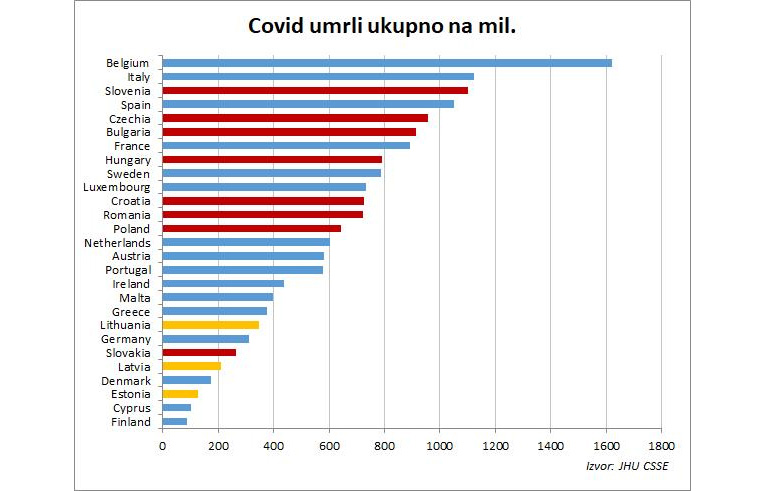
Graph 4. Total coronavirus deaths per million. Source: Index.hr / JHU CSSE
They occupy eight of the first 13 places. If we exclude the small Baltic countries, only Slovakia remains in the lower half, but the situation deteriorates quickly, and it could easily get to the upper half.
As we can see, there is something special about the small Baltic countries and Finland. We still don't know what, and it doesn't matter for this analysis either. If we single out those countries, things become clearer, but the analysis works without them.
- What is the explanation? It can be the following:
- A. It has been shown that COVID-19 is highly seasonal. In NE countries, the epidemic came later in late winter 2020 and therefore could have done much less damage by the time spring came. This is undoubtedly the case with Croatia, as you can see in Graph 5: the reproductive factor R fell below 1 already before the end of March, before the measures were introduced on March 23 in Croatia and could take effect.
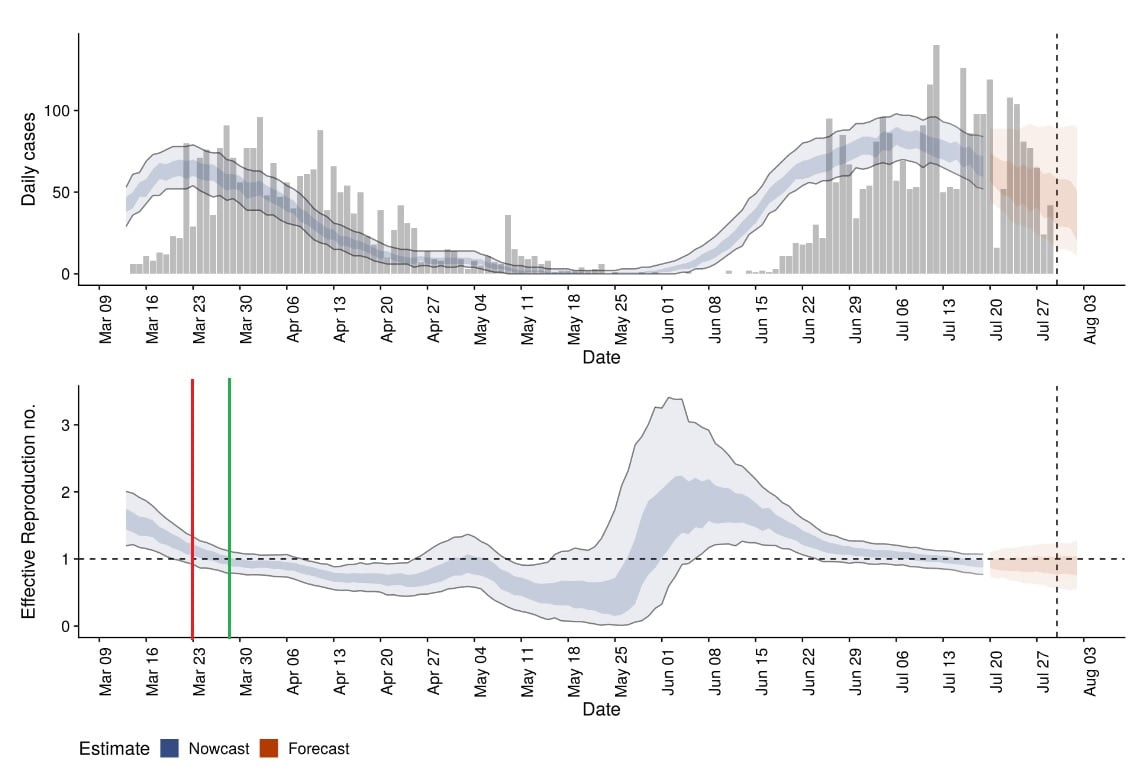
Graph 5. Source: Index.hr
The introduction of a movement prohibition and a drop in R below 1 are marked with a red and green line. An international group of the London School of Health and Tropical Medicine made this calculation, in which a member of the Croatian Scientific Council also participated. Somehow they later forgot to let us know that R had already fallen below 1 even then. However, at the beginning of the epidemic, everything was explained with its help, which advanced countries are doing now. From a time perspective, all of this is now obvious, and that first wave seems completely benign compared to this one now.
But let's remember the psychosis in which we lived then when the concept of "Camp Croatia" with GPS tracking and leaving the house every third or fifth day was already announced when the epidemic was already falling. Inexperienced and impressed by the violent measures, we thought they helped.
But why did the epidemic come later? Here I think the key is in international connectivity. I used an imperfect DHL connectivity index and got a great explanation of the difference, which can be seen in the following chart.
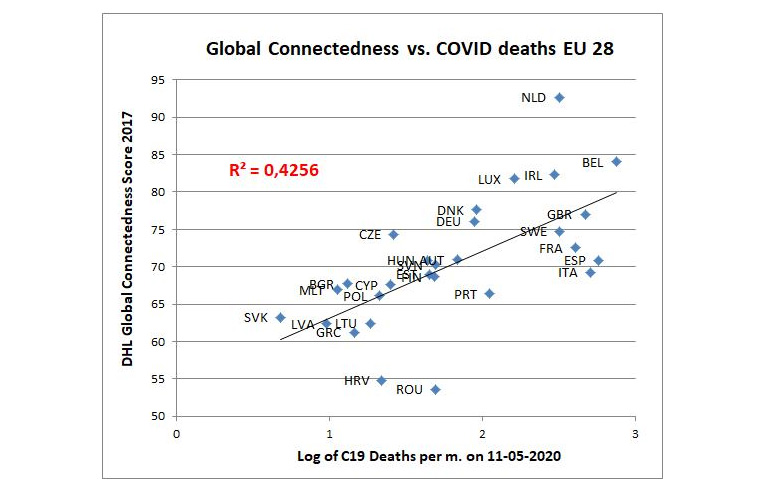
Graph 6. Source: Index.hr
Interestingly, even such an imperfect measure of connectivity explains so much of the variation. As we know, the most affected countries are also the most connected: Italy – densely populated Lombardy and workers from China; Italy, France, Spain – tourism; Belgium – the center of the European Union and others; Sweden – far more connected than its neighbors; and a million Swedes went on school holidays abroad in the last week of February.
- B. The first wave was actually far stronger than it seems now because we tested and hunted cases much less. Many countries found that their dark number (undiscovered cases) was several tens of times higher than those found. In our country, depending on the interpretation of the data, 50 to 80 times, in Denmark 80 (at some point). Now the dark number is probably 5 to 10 in most countries, and the current maybe even just 3 because as more and more people are being tested, and more and more people have been exposed to the virus, the significant dark number has nowhere to hide.
Therefore, most of the countries of old Europe became infected in the spring, a part of the population gained immunity, and significantly more than in the NE, which we cannot see well if we look only at the cases.
- C. It is now quite clear that strongly seasonal is not only an epidemic of SARS-CoV-2 virus but also COVID-19 disease. Clinical pictures are, on average, far more difficult now than a month or two ago. Mortality rates in most EU countries have doubled in just a month or two, meaning twice as many people die among those confirmed infected. It is also the insight of an international group of scientists in which Croatians Gordan Lauc, Alemka Markotić, Dragan Primorac, and others also participated. At first, it was controversial, but now it is generally accepted. Those infected in spring (more in the old than in the NE) had a much better chance of surviving.
- D. One explanation indeed lies in the quality of hospital systems. I believe richer countries have more resources. For example, expensive HFOT devices save lives better than respirators (Croatia has now procured a larger quantity).
- E. Other variables could be considered, such as previous flu seasons, the percentage in the population over 80, or the people in nursing homes. Still, I believe they would indicate a lower expected number of deaths in the NE (but I did not check the data).
In general, the NE countries, including Croatia, were not particularly unprepared for the supposedly expected strong second wave. Let's look at how strength and early outbreak surprised even the most advanced countries, with entirely different strategies: from Germany through Denmark and the Netherlands to Sweden. Remember that in almost all countries, politicians said "let's just wear masks, and we won't need any special measures," then "let's introduce some measures, and we certainly won't need lockdown," and so on. Now we have reached a solid lockdown in almost the entire Union.
Even Germany, the first wave model, is experiencing a real drama after a failed soft lockdown that was supposed to ensure a peaceful Christmas. Denmark and some other countries are already overtaking us in terms of the number of infected. It is not impossible for Germany to overtake us, even in terms of deaths.
In some countries, a third or "second B" wave is already being born, under the influence of winter COVID-19. R is contextual, and even if it falls below 1, under the influence of various circumstances, it can return over 1. It seems that our second wave peak was delayed by merging with that (surprising to all) the third wave.
Conclusion
- The development of the epidemic is mostly beyond the reach of the authorities.
- Countries with stronger measures do not fare better than those with weaker ones. For example, Slovenia is the worst in this group, despite introducing extreme measures before the epidemic escalated.
- The introduced travel ban is not useful. The inspiration for it was the spring ban, which was considered our most important measure, and obviously did not affect the epidemic.
- On the whole, we are not somewhat more unsuccessful than others. Indeed, although some have had significantly stronger measures for longer (this is one group we can compare ourselves to, and the other is our neighborhood shown in Graph 7, and only Serbia is better than us), we should consider any success or failure relatively. It is known that some measures work, such as banning gathering, maintaining physical distance, washing hands, ventilation, etc. The introduction of measures should be proportionate to the goal because the disproportionate introduction of measures has severe negative consequences for society. Countries that introduce brutal and unnecessary measures (there are arguments that some brutal measures even encourage an epidemic) can also cause significant collateral damage to their populations' lives and health.

Graph 7. Showing data from October 6, 2020 to December 19, 2020. Source: ourworldindata.org
Let's not forget, the goal in epidemic control is to bring the reproductive factor R below 1, and "zero-covid" strategies have long since been abandoned. Fortunately, in Croatia, R is currently significantly below 1. Let's hope that the data on the epidemic we have are credible and that such a situation will persist.
Of course, the main goal is to save as many lives as possible, although we are often helpless with the virus. Therefore, it is necessary to adhere to epidemiological measures with enhanced protection of vulnerable groups.
To read more about coronavirus in Croatia, read TCN's dedicated page.
HZZO Absurdity, Again: Private Facilities Offer Patient Care, HZZO Says NO
December the 19th, 2020 - I think just about everyone has an HZZO story, and not a positive one. I myself have quite a few of them in which they sought documents that quite literally do not even exist before they'd agree to give me access to what my employer pays every single month and what I have a fundamental right to - basic healthcare. I know I'm far from the only one, and this article is, as such, unlikely to surprise anyone.
As Poslovni Dnevnik/Marija Crnjak writes, due to the influx of patients who couldn't go to hospitals to have various tests done because of the ongoing pandemic, private polyclinics asked the Croatian Health Insurance Institute (HZZO) to contract a larger number of procedures for referrals multiple times throughout the year. HZZO said no.
HZZO refused them to perform this act of decency every single time, explaining that the request was unjustified precisely because the contracted capacities of public hospitals apparently remained unused, ie vacant. This primarily regards magnetic resonance imaging (MRI) and PET CT scans, the sort of examinations that are most often needed by cancer patients, and many of them cannot be delayed due to the nature of that disease.
Private institutions that provide some of the services at the expense of HZZO, such as the Medikol polyclinic and the Sveta Katarina Special Hospital, warned that the state hasn't used the services of private health institutions in other segments during the pandemic, even though they've been offering such services readily since back in spring.
HZZO figures confirm that the pandemic has slowed down important diagnostics, but also that public hospitals, even without the presence of the novel coronavirus, have a generally weaker execution of contracted procedures than private ones do. Last year, hospitals performed 95 percent of their planned MRI procedures, and this year only 80 percent were performed, ie 110.3 thousand procedures instead of the contracted 136.5 thousand of them.
About a hundred fewer patients are being treated in hospitals per month than they were in the previous months, and almost 5,000 fewer bedridden patients were treated than last year, equal to about 12 percent less on a monthly basis. In the case of PET CT this year, the number of examinations at the University Hospital Centre Zagreb is similar to last year (3174), but last year and this year, about a third fewer procedures were performed than agreed.
In 2020, 4620 procedures were contracted at Rebro, and 3174 of them were performed. Back in pre-pandemic 2019, 29,516 magnetic resonance procedures were contracted in private polyclinics, and 25 percent more were performed.
For the same money, 30,208 procedures were contracted during the first 11 months of this year, and 15 percent more were performed. Polyclinic Medikol, the only private institution that performs PET CT, performed 99 percent of its contracted examinations last year, as was the case during the first 11 months of this year.
The Medikol Polyclinic has an agreed number of services with HZZO, which mostly involve radiological and nuclear diagnostics, at the level of 40 percent of the capacity utilisation that the polyclinic actually has at its disposal. During 2020, Medikol has repeatedly asked HZZO to increase its services at the expense of the Institute, and as stated, HZZO said no, despite the dire situation we're all in.
''Unfortunately, HZZO keeps on giving us negative answers to all of our inquiries about the possibility of increasing this contractual limit, with the explanation that we're not the only contracted health institution,'' stated a rightfully annoyed Trstenjak Rajkovic of Medikol.
This year, the number of patients who paid for services themselves because they couldn't have them performed normally in public health institutions increased, and due to the limited contracted number, they couldn't provide the service based on a referral.
At the same time, due to the ongoing crisis, they had a large number of appointments. When it comes to PET/CT, they have a fixed contractual number of tests for a total of 7380 procedures per year, which is why a good part of oncology patients were literally forced to pay for this test out of their own pockets, and it costs about 10 thousand kuna. When it comes to MRI devices, about 10 thousand procedures are contracted per year.
As has since been found out, HZZO does indeed plan to extend the contract period, and after a comprehensive analysis of how things were executed this year, and in accordance with available funds, it will plan as well as possible. Medikol expects that the number of procedures will increase in 2021, because the pandemic hasn't simply annulled the existence all other, often very serious diseases.
At Medikol, they believe that the low level of cooperation between public and private healthcare in Croatia is still a question of stigmatisation of the private sector. The director of the aforementioned polyclinic pointed out that in a situation where the public health system is overloaded, enviable human and material resources boasted private healthcare facilities remain unused.
HZZO confirmed that during the contracted period there were no changes in the contracts they hold with private facilities, meaning there were no changes in the scope of work despite the need for that obviously being stronger than ever before.
Jadranka Primorac, a member of the Management Board of the St. Catherine's Special Hospital, pointed out that HZZO's cooperation with private institutions could only represent savings for the state, and not an extra cost.
"By contracting with private institutions, the state pays only for the service, and we bear the costs of everything else, from the purchase and maintenance of equipment to staffing costs and all other costs. It's clear to us that the pandemic, along with the reduction of economic activities and the consequent situation with the state budget, caused a loss of revenue and additional costs for public health, but additional contracting in the last quarter of 2020 wouldn't be a major financial expense for HZZO and would significantly contribute to reducing waiting lists. Through the Croatian Employers' Association, we offered cooperation to the Ministry of Health way back in March to help during the pandemic,'' revealed Jadranka Primorac.
St. Catherine's Hospital has contracted very little further capacity for radiological examinations with HZZO, which will only further increase the burden on the public healthcare system, especially in the future when even greater pressure is expected from patients who couldn't get things done because of the virus.
"Our goal isn't for HZZO to cover all services, but there's room for expansion and I hope that it will be considered,'' concluded Primorac.
For the latest travel info, bookmark our main travel info article, which is updated daily.
Read the Croatian Travel Update in your language - now available in 24 languages


